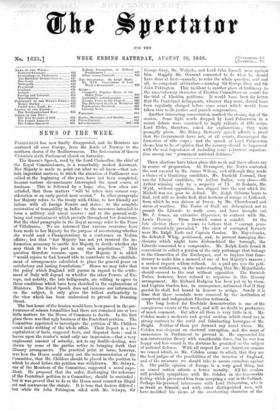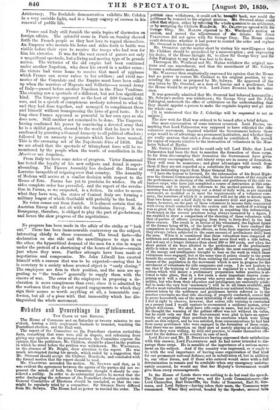Three elections have taken place this week and three others
are in course of preparation. At Devonport, the Tories contested the seat vacated by Mr. James Wilson, and although they made a choice of a blustering candidate, Mr. Busfield Ferrand, they ran the Liberal candidate, Sir Arthur Buller, very close—Sir Arthur winning only by a majority of 75. At Bodmin, Mr. Wyld, without opposition, has slipped into the seat which Dr. Michell was too poor to defend. Mr. Ralph Osborne hopes to find, and will no doubt find, that harbour of refuge at Liskeard, from which he was driven at Dover, by Mr. Churehward and stress of weather. The Tories of Hull are determined not to permit the Liberals to walk over, and have brought out Mr. J. Somes, an extensive shipowner, to contend with Mr. Lewis Harvey. From Berwick comes a scandal. At the late election there is reason to believe that " corrupt prac- tices extensively prevailed." The elect of corrupted Berwick were Mr. Ralph Earle and Captain Gordon. Mr. Majoribanks, the defeated Whig, petitioned, and, to prevent damaging dis- closures which might have disfranchised the • borough, the Liberals consented to a compromise. Mr. Ralph Earle found it convenient to solicit a portion of the only patronage that belongs to the Chancellor of the Exchequer, and to implore that func- tionary to make him a steward of one of her Majesty's manors ; a modest request seldom refused. As a quid pro quo the peti- tion was withdrawn, on the understanding that Mr. Majoribanka should succeed to the seat without opposition. The Berwick Tories, however, have refused to acquiesce in this illusory arrangement. Mr. Richard Hodgson has been put up by them, and Captain Gordon has, in consequence, intimated that if they persist he shall feel bound in honour to resign. Surely it is time that these scandals were removed by the institution of competent and independent Election tribunals.
The long looked for Rochdale demonstration is one of the conspicuous events of the week, and will no doubt be productive
of much comment. But after all there is very little in it. Mr. Cobden made a moderate and genial oration which stood out in
strong contrast to the acrid and fulminating harangue of Mr.
Bright. Neither of them put forward any novel views. Mr. Cobden was eloquent on electoral corruption, and the want of earnestness in Parliament to prevent it. He expounded his non-intervention theory with considerable force, but he was less happy and less sound in the doctrine he preached on the subject of national defence. With all respect for our American cousins we cannot admit, as Mr. Cobden seems to admit, that they are the best judges of the possibilities of the invasion of England, and of the measures we should take to secure ourselves against
it. The public opinion of Europe is a very good thing, but an armed nation affords a better security. All his readers
will probably sympathize with Mr. Cobden in the honourable
feeling which prevented him from accepting a seat in the Cabinet. Perhaps his personal intercourse with Lord Palmerston, who is
as frank as himself, and with other distinguished men, will have modified his views of the overbearing character of the
Aristocracy, The Rochdale demonstration exhibits Mr. Cobden in a very amiable light, and is a happy aug-ury of SUMAS in is renewal of public life.



























